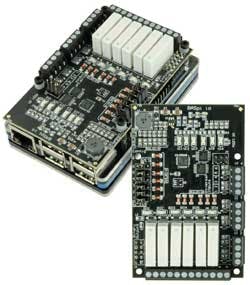Contemporary Controls BASpi I/O board for Raspberry Pi
Contemporary Controls' BASpi I/O board for Raspberry Pi turns the Raspberry Pi 3 into a capable control device with web-based configuration, universal IO and industry standard data communication and control protocol: BACnet.
Two versions of the BASpi are available. One is the BASpi I/O board for those people who already have a Raspberry Pi and are experienced with programming it. The other version is an entire system, which includes the Raspberry Pi 3 board, the BASpi I/O board, an industrial grade μSD card with pre-written image, international power supply and an enclosure case.
The I/O board, plus the firmware files provided by Contemporary Controls, turn a Raspberry Pi into a BACnet-networked, Sedona-programmable controller with 6 universal inputs, 6 relay outputs and 24 BACnet virtual points. Software support for the BASpi includes a graphical programming tool, project backup and restore utility and an emulator packaged in the free BAScontrol Toolset.
The BASpi is an open controller they can be easily set up and used. It includes a Sedona Virtual Machine (SVM) that can be freely programmed using Sedona’s drag-and-drop methodology of assembling components onto a wire sheet to create applications. Contemporary Controls provides a free Sedona Application Editor to assist with programming.
Besides being an open Sedona controller, the BASpi is BACnet/IP compliant. Configuration of BACnet points is via web pages. Time-of-day is handled with a NTP server. With both Wi-Fi and Ethernet ports on the Raspberry Pi, it is possible to be attached to a BACnet head-end on the Ethernet port while programming the controller over Wi-Fi.

